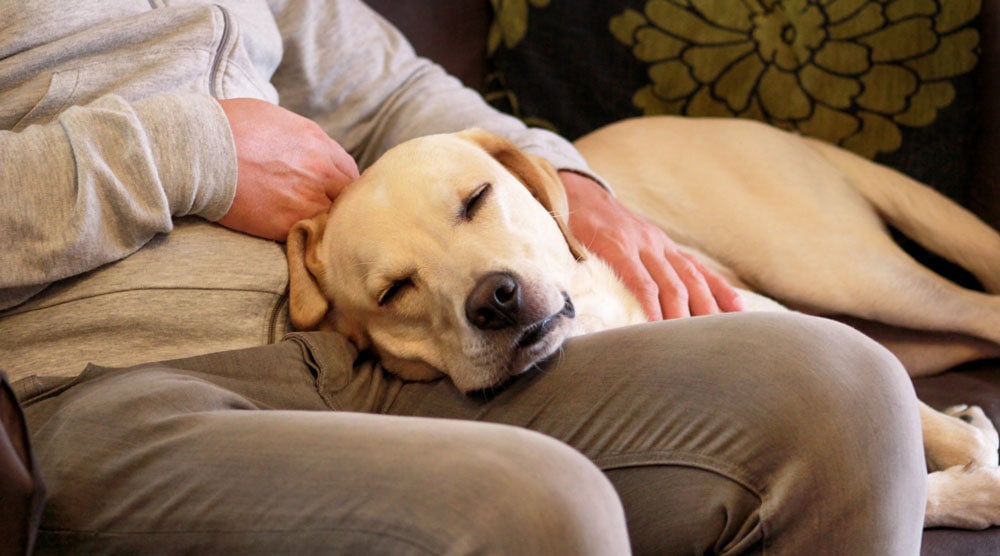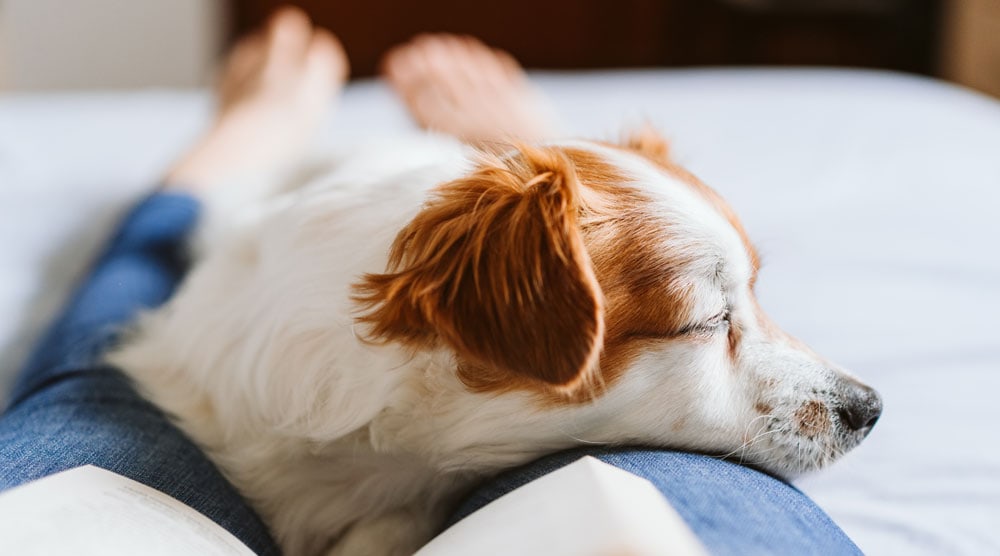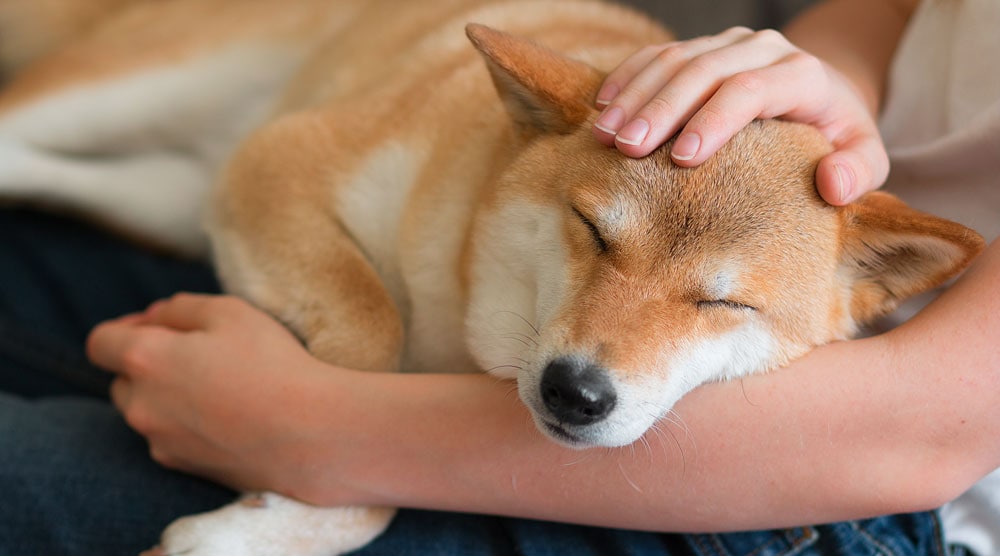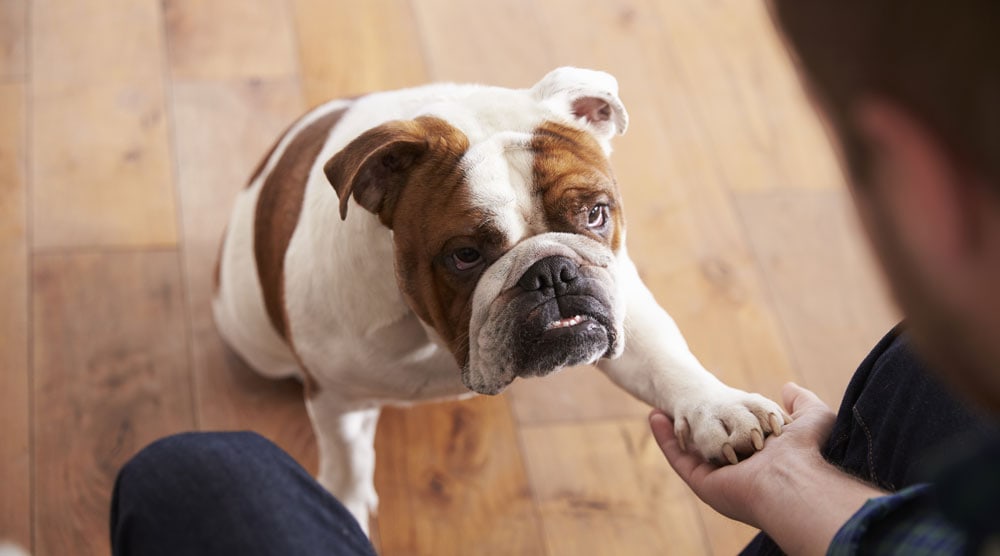Why does your dog lay on you? Should you be worried about this behaviour? Keep reading to find out!
Contents
Laying or sleeping on you is often a way for your pet to show affection or relax. But it can occasionally be a sign of a problem, such as separation anxiety or illness.
In this article, we’ll go through:
- 4 common reasons for a dog laying or sleeping on you
- Why this behaviour is (usually) a good sign!
- 3 potential downsides of a dog sleeping on you
- How to encourage your dog to sleep elsewhere using positive methods
- Much more!
Why Does My Dog Lay On Top of Me?
Many dogs enjoy laying on their owners. There’s usually no harm in this – especially as it’s relaxing for you and your pet.
You should always look at your dog’s overall body language when judging their behaviour though.
If your dog is dozing on your lap while being fully relaxed, for example, they probably enjoy the warmth and comfort you provide. But if your dog is alert and looking around, then they may be anxious and seeking reassurance.
Let’s take a closer look at some of the most common reasons for a dog laying on you.
Seeking or Providing Emotional Support
Many dogs feel most relaxed when with their owner. For some dogs, the closer the better!
For this reason, your dog may lay on you to reduce anxiety or to feel more relaxed.
Dogs can also sense when a loved one is stressed or anxious. In fact, the stress hormone cortisol has been shown to increase in dogs when their owners are stressed.
So, if your dog tends to lay on you when you’re tense or upset, they may be trying to provide comfort.
Seeking Warmth or Comfort
Aside from providing emotional support, you may just be the most comfortable place for your dog to lay down.
Soft clothing, body heat, and a comforting scent combine to make your lap, chest, or belly an excellent place for your dog to sleep.
Seeking Attention
Dogs are social animals that need plenty of interaction and mental stimulation. So if they are bored or feeling lonely, laying on you (or alternatively going between your legs or stretching on you) may be a way to get attention.
It’s important not to punish this behaviour. Laying on you is a gentle way of your dog signalling what they need, so it’s essential to take notice and consider why they feel this way.
Some common reasons for boredom include:
- They are not getting enough exercise. Dogs need varying amounts of exercise depending on their breed, health, and age. Ensure your pet receives the right amount of activity to meet his daily needs.
- A lack of mental stimulation. Mental stimulation is just as important as physical exercise. Giving your dog time to sniff and explore on walks will help, but indoor games and activities are also essential.
- Too much time alone. Dogs thrive when they are with people that they love. Therefore, we never recommend leaving your dog alone for more than a few hours each day.
Tip: If you don’t want your dog to lay on you for attention, then it’s important not to reinforce the behaviour. Take note of why your dog may need more attention, then give it to your pet when he’s behaving in a way you want to reinforce.
They Love and Trust You!
One of the most obvious reasons for a dog laying on its owner is that it feels good!
Whenever your dog is near you and having a positive experience, oxytocin is released into their bloodstream. Oxytocin is known as the “love” hormone as it plays a key role in the strong bond we have with our dogs.
Oxytocin is often released in response to touch, so laying on you is an easy way for your pet to relax. It’s also a great way to develop your bond, as oxytocin is involved in developing stronger relationships.
A dog will only lay on someone who she trusts and loves. So, consider it a big compliment if your dog lays on you!
What Does It Mean When Your Dog Lays or Sleeps On You?
There are many potential reasons for your dog to sleep on you, including physical comfort, emotional support, and love.
But one thing laying on you doesn’t mean is that your pet is trying to be dominating or aggressive.
Whether your dog lays his head on your lap, sleeps on your chest, or snuggles up next to you on your sofa, this behaviour has nothing to do with dominance.
In fact, the whole idea of dogs trying to be “dominant” in a household has been debunked – yet the concept is still often repeated.
This is unfortunate, as it means many people deny themselves the joy of snuggling up with their pet!
Related Article: Why Does My Dog Put His Paw On Me

Debunking the “Pack Leader” Theory
The idea that you need to be “pack leader” or the “alpha” has been disproven many times. Even the original study on wolves has been discredited, as it involved wolves who were forced to live in unnatural environments with other unrelated wolves.
Even if the study hadn’t been debunked, dogs are not wolves and cannot be directly compared. Your dog isn’t altering his behaviour because he wants to show disrespect or become the “alpha,” so avoid judging him through this lens.
Are There Any Reasons to Worry About This Behaviour?

While laying on you isn’t usually a problem, there are a few situations where it can be a symptom of another issue. Here are a few examples.
Dogs Can Sometimes Detect An Illness
You may have heard about dogs who can detect illnesses such as cancer. These dogs use their keen sense of smell to sniff out tiny particles associated with various diseases, which can help with early detection.
How common is this ability though? And do dogs lay on the areas affected by the disease?
While dogs can smell certain diseases, they don’t tend to lay on the affected area. For example, in a study on melanoma, the dogs usually licked, nipped, and sniffed the area rather than lay on it.
So, while it’s possible that a dog laying on a specific area of the body may indicate an illness, it’s unlikely.
Even so, if your dog seems to have noticed something unusual on your body, particularly if she is continuously sniffing or staring at an area, then get it checked by a doctor to be safe.
Sleeping With a Dog Can Affect Sleep Quality
Dogs have been sleeping with their owners for centuries, and there isn’t a behavioural downside to letting your dog sleep with you. It won’t cause separation anxiety, for example, although if your dog is distressed when they can’t sleep with you then this can be a symptom of this condition.
Many people also enjoy the warmth and comfort of sleeping with their pets. There’s nothing quite like the companionship of snuggling up next to a warm dog at night!
However, if your dog likes to lay on you during the night, then it’s worth considering whether this is good for your sleep quality.
Dogs often move around a lot during the night, which can affect your deep sleep. They are also naturally more alert when sleeping, which means they may wake up and move around if there’s a noise.
Sleeping with a dog can also aggravate allergies. If your allergies are triggered by pet dander or dust, then it may not be a good idea to allow your dog to sleep on you.
A Dog Laying On You Can Be a Sign of Separation Anxiety
There are many myths about letting a dog sleep on its owner.
One of the most common is that dogs become excessively attached to humans if they are allowed to sleep on them, leading to separation anxiety.
While separation anxiety is a serious condition that requires the advice of a qualified behaviourist, allowing your dog to sleep on you won’t cause it.
Needing to be near you to relax is a common symptom of separation anxiety though. Others include pacing, an inability to settle, destructive behaviour, persistent barking, and going to the toilet in the house (when the dog is usually house-trained).
If you suspect your dog has separation anxiety, you should contact a behaviourist as soon as possible.
How to Teach Your Dog Not to Sleep on You

Many dogs love sleeping with their owners – and most humans enjoy it too!
If you want to encourage your dog to sleep elsewhere, however, then here are some tips for doing so:
- Make sure your dog has a comfortable and quiet sleeping spot. Some dogs are picky about their beds, so you may need to try various bed materials and styles to find one he likes.
- Give your dog plenty of mental and physical stimulation. This prevents boredom and can reduce attention-seeking behaviours.
- Reinforce alternative behaviours. If your dog only gets attention when he physically touches you – including laying on you – then she’ll learn that this is how to get affection. Ensure you give your dog attention at other times to reinforce alternative behaviours.
- Keep your dog out of the bedroom. The easiest way to prevent your dog from sleeping with you overnight is by keeping her out of the bedroom.
These tips only apply to dogs who are sleeping on you because they enjoy it. If your dog can’t leave your side due to separation anxiety, then you should contact a qualified dog behaviourist.
Frequently Asked Questions
Why Does a Dog Sit On You?
Dogs sit on humans for many of the same reasons as sleeping on them. These include warmth, emotional support, comfort, and being as close as possible to a human they love.
Sometimes a dog may choose to sit on you just because it’s easier than laying down – especially if they are a big dog.
Why Do Dogs Lay on Other Dogs?
Again, laying on other dogs is usually a sign of relaxation and affection. So it’s not usually something to worry about, as long as both dogs enjoy it.
Summary
Dogs lay on people for comfort, warmth, and love. They may also lay on someone for attention if they are not receiving enough physical and mental stimulation.
Laying on you isn’t a sign of dominance and won’t cause separation anxiety. So, if your pet enjoys sleeping on you, consider it a sign of trust and your strong bond.
We hope this article has helped you understand why your dog might lay on you. To learn more about canine sleeping patterns and habits, you may want to read our article about why dogs sleep under beds.




